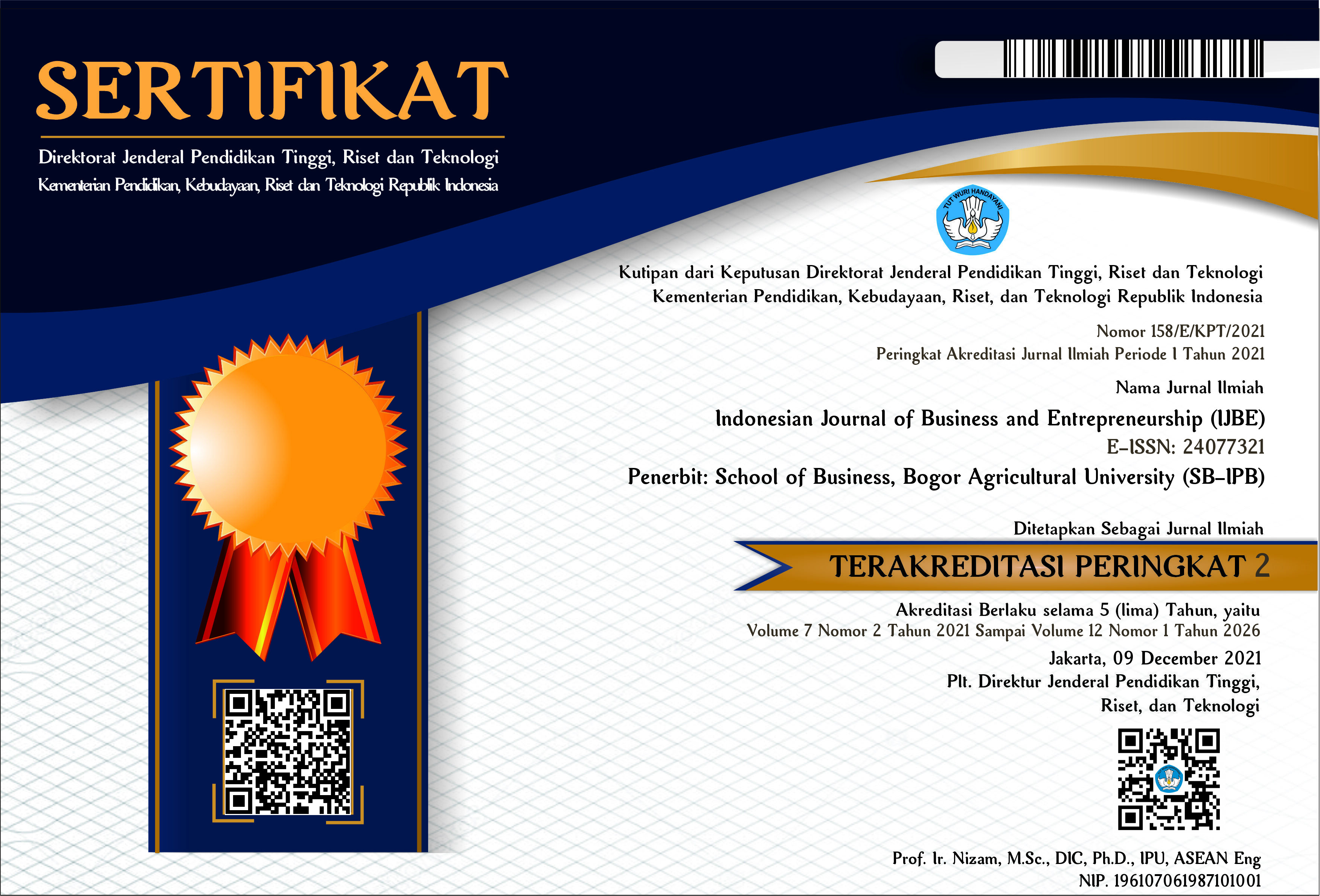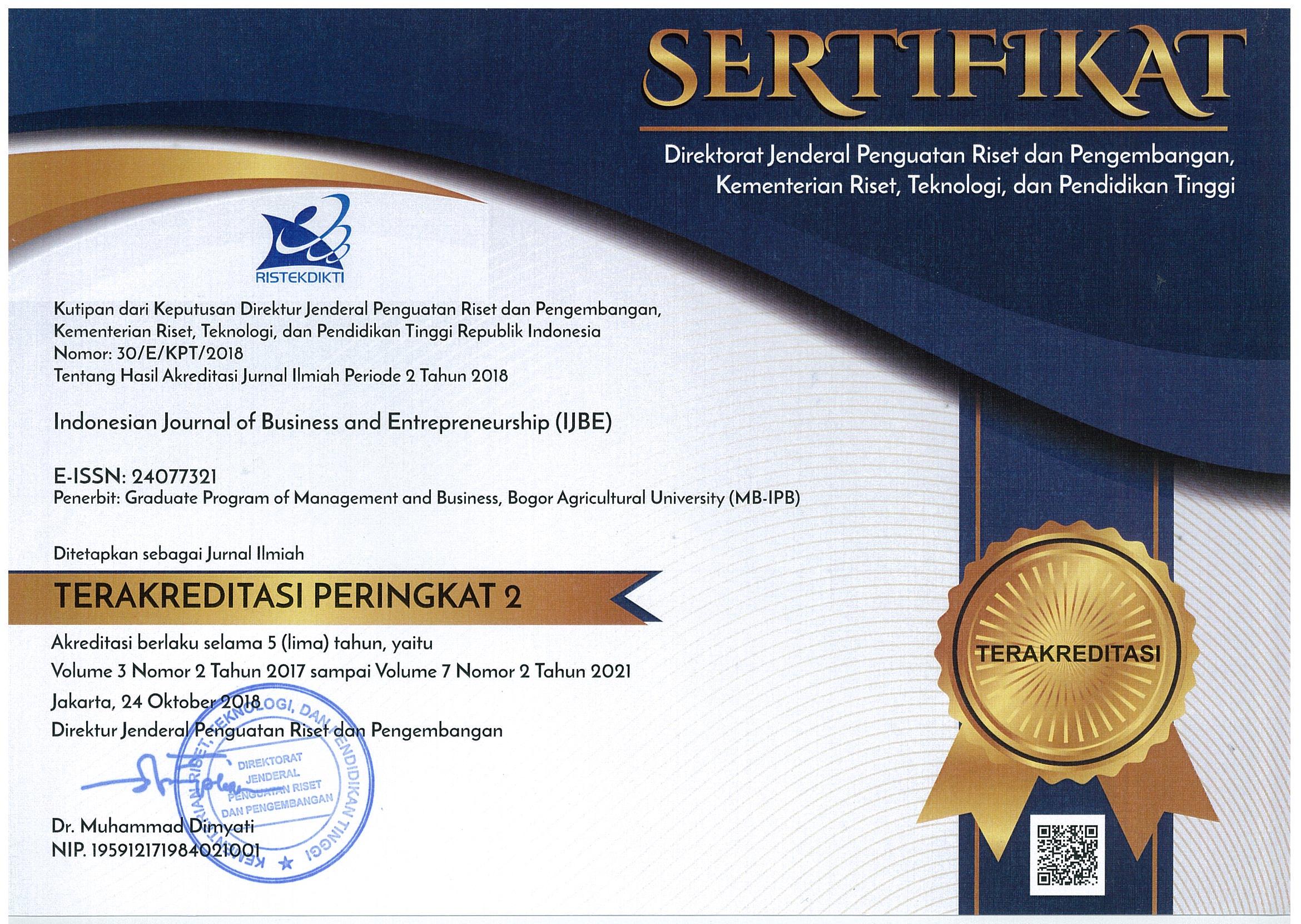HOW INNOVATION ENCOURAGES SELF EFFICACY TO SUPPORT BUSINESS START UP SUCCESS?
Abstract
A business start up is identical to a new business run by an entrepeneur to gain profit. The research is to analyze the function of the entrepreneurship training given by Universitas Ciputra Surabaya to the villagers in Desa Mojowarno. The objectives of the research are: 1) to learn the proper innovation technique to increase the self efficacy of the entrepreneur/participant, 2) to understand the impact of the increased self-efficacy towards the business continuity managed by the entrepreneur/participant. The research method used is qualitative descriptive analysis with the subject of the research are entrepreneurs (ten training participants) who managed banana trunk chips in Mojowarno. The validation technique used in this research is triangulation data method with participative observation, in depth interview and documentation (photo and video of the participants’ capability). The result of the research: 1) Innovation realization (5+1 concept) succeeded in increasing the self efficacy of the participants (ten training participants); 2) The self-efficacy increase provides a positive impact (business increase) so that the entrepreneur has an additional income. It is suggested that the entrepreneur must keep on innovating innovated to increase their self-efficacy so that the business can improve the continuity.Keywords: descriptive qualitative, innovation, self-efficacy, business entrepreneur start up, training
ABSTRAK
Start-up bisnis identik dengan usaha baru yang dijalankan oleh seorang entrepreneur untuk mendapatkan keuntungan. Penelitian ini menganalisis peran pelatihan kewirausahaan yang diberikan Universitas Ciputra Surabaya kepada masyarakat Desa Mojowarno. Tujuan penelitian ini terdiri dari: 1) mengetahui teknik yang tepat untuk berinovasi guna meningkatkan self-efficacy dari entrepreneur/peseta yang mengikuti pelatihan, 2) Mengetahui dampak dari peningkatan self-efficacy terhadap keberlangsungan bisnis yang dijalankan oleh entrepreneur/peserta pelatihan kewirausahaan. Metode penelitian menggunakan analisis kualitatif deskriptif dengan subjek penelitian adalah entrepreneur(sepuluh orang peserta pelatihan kewirausahaan) yang menjalankan bisnis keripik bonggol pisang di Mojowarno. Teknik validasi dalam penelitian menggunakan metode triangglasi data dengan observasi parisipatif, wawancara mendalam, dan dokumentasi (foto dan video kemampuan peserta). Hasil penelitian: 1) Realisasi inovasi(konsep 5+1) berhasil mendorong peningkatan self-efficacy dari entrepreneur(sepuluh peserta pelatihan), 2) Peningkatan self-eficacy memberikan dampak positif(peningkatan bisnis) sehingga entrepreneur(peserta pelatihan) sudah memiliki pendapatan tambahan. Saran bagi entrepreneur harus terus berinovasi untuk peningkatan self-efficacy sehingga peningkatan bisnis terus berlangsung.
Kata kunci: kualitatif deskriptif, inovasi, self-efficacy, start-up bisnis,entrepreneur, pelatihan
Downloads
References
Bungin B. 2013. Penelitian Kualitatif. Jakarta: Prenada Media Group.
David D, Battisti JBM. 2016. Entrepreneurial skill and regulation Evidence from primary sector rural entrepreneurs. International Journal of Entrepreneurial Behavior & Research 22(2): 234–259.https://doi.org/10.1108/IJEBR-12-2014-0240.
Dianna D, Jennings J. 2014. Gender and entrepreneurial self-efficacy: a learning perspective. International Journal of Gender and Entrepreneurship 6(1):28–49.https://doi.org/10.1108/IJGE-02-2013-0013.
Fontana A. 2011. Innovate We Can! Manajemen Inovasi dan Penciptaan Nilai. Jakarta: Penebar Swadaya.
Inggarwati K, Arnold K. 2012. Peranan Faktor-Faktor Individual dalam Mengembangkan Usaha Studi Kuantitatif pada Wirausaha Kecil di Salatiga.International Research Journal Of Business Studies 3(2).
Jogiyanto. 2011. Pedoman Survei Kuesioner: Mengembangkan Kuesioner, Mengatasi Bias dan Meningkatkan Respon. Yogyakarta: Fakultas Ekonomika dan Bisnis UGM.
Kumalasari YY. 2014. Pembinaan dan pemberdayaan pengrajin batik (studi di Dinas Koperasi, UKM, Perindustrian, Perdagangan dan ESDM Kabupaten Sidoarjo dan Industri Kecil Kampoeng Batik Jetis Kabupaten Sidoarjo). Jurnal Administrasi Publik 2(1): 66–70.
Leon S, Justin BC. 2017. Development and validation of a unidimensional domain-specific entrepreneurial self-efficacy scale. International Journal of Entrepreneurial Behavior & Research 23(1):98–113.https://doi.org/10.1108/IJEBR-11-2015-0251.
Liu J, Cho S, Putra ED. 2017. The moderating effect of self-efficacy and gender on work engagement for restaurant employees in the United States.International Journal of Contemporary Hospitality Management 29(1):624–642. https://doi.org/10.1108/IJCHM-10-2015-0539.
Fernando L, Jayawarna D. 2011. Enterprise education: the effect of creativity on training outcomes, International Journal of Entrepreneurial Behavior & Research 17(3): 224–244. https://doi.org/10.1108/13552551111130691.
Matlay H. 2008. The impact of entrepreneurship education on entrepreneurial outcomes. Journal of Small Business and Enterprise Development 15(2): 382–396. https://doi.org/10.1108/14626000810871745.
Maulani TS, Dialysa F, Prawirasasra KP. 2016. Pelatihan Pembukuan Keuangan Sederhana Dan Motivasi Kewirausahaan Pada Kelompok Usaha Makanan Rw 02 Kelurahan Neglasari Kecamatan Cibeunying Kaler Bandung, Jurnal Dharma Bhakti STIE Ekuitas 1(1): 32–37.
Miller P, Wedellsborg TW. 2013. Innovation Business As Usual How To Help Your People Bring Great Ideas To Life. Boston: Harvard Business Review Press.
Molaei R, Mohammad R Z, Mohhammad HM, Jahngir YF. 2014. The impact of entrepreneurial ideas and cognitive style on students entrepreneurial intention. Journal of Entrepreneurship in Emerging Economies 6(2): 140–162. https://doi.org/10.1108/JEEE-09-2013-0021.
Putri SA, Warianto W. 2017. Pengaruh Pelatihan dan Kalimat Motivasi Terhadap Produktifitas Kerja Karyawan UMKM. Optima 1(1): 60–71.
Prabhu VP, Stephen J. McGuire EA, Drost KK. Kwong. 2012. Proactive personality and entrepreneurial intent Is entrepreneurial self-efficacy a mediator or moderator?, International Journal of Entrepreneurial Behavior & Research 18(5): 559–586. https://doi.org/10.1108/13552551211253937.
Rauth BB. 2014. Impact of education and training on performance of women entrepreneurs A study in emerging market context. Journal of Entrepreneurship in Emerging Economies 6(1): 38–52. https://doi.org/10.1108/JEEE-05-2013-0014.
Rosianti W. 2014. Upaya Dinas Koperasi Ukm Dalam Menyelenggarakan Pendidikan Dan Pelatihan Kewirausahaan Untuk Meningkatkan Motivasi Berwirausaha (Studi Pada Dinas Koperasi, Ukm, Perindustrian, Perdagangan dan Esdm Sidoarjo). Jurnal Administrasi Bisnis 12(1):1–8.
Peter R, Quan VLe. 2015. Teaching business skills to women Impact of business training on women’s microenterprise owners in Vietnam. International Journal of Entrepreneurial Behavior & Research 21(4):622–641. https://doi.org/10.1108/IJEBR-06-2014-0099.
Shah AS, Rohani MBHK, Noor GMN. 2015. Personal values and entrepreneurial orientations in Malay entrepreneurs in Malaysia Mediating role of self-efficacy. International Journal of Commerce and Management 25(4): 385–401. https://doi.org/10.1108/IJCoMA-01-2013-0001.
Sucipto E, Oktaviani R, Rizal R. 2015. The effects of partnership and entrepreneurship toward business performance of Oyster Mushroom (Pleurotusostreatus). Indonesian Journal of Business and Entrepreneurship 1(1):32–41. https://doi.org/10.17358/IJBE.1.1.32.
Sweida GL, Rebecca J. Reichard. 2013. Gender stereotyping effects on entrepreneurial self-efficacy and high-growth entrepreneurial intention. Journal of Small Business and Enterprise Development 20(2): 296–313. https://doi.org/10.1108/14626001311326743.
Wiska F, Syarief R, Baga LM. 2016. Developing "sekolah peternakan rakyat" program using the business model canvas approach (case study: Bojonegoro Regency). Indonesian Journal of Business and Entrepreneurship 2(2):69–81. https://doi.org/10.17358/IJBE.2.2.69.








